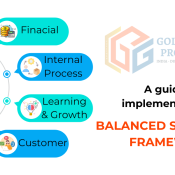
The Operational Strategy: Making It Work For Your Organization (Part 1)
The majority of operations plans fail. Why is this the case? Is it because they haven’t been properly implemented? Or is it because they are designed to fail from the start?
The Answer: BOTH
Your folks have a lot on their plates. Each team is like a ship without a rudder without a defined roadmap for decision-making and competitive priorities. To optimise their chances of success, people require a human-centred approach to long-term planning.
You must develop an operations plan that takes into account the customer experience, the product lifecycle, and everything going on in-house, from people to resources to operational skills.
This blog from GOLDEN GATE PROPERTIES will teach you:
What an operations strategy is.
How an operations strategy can bring your team together.
Types of operating strategies.
What a good operations strategy includes.
How the essential elements of your strategy promote growth and evolution.
Okay, got your coffee topped up and ready? Let’s roll.
What exactly is an operations strategy?
An operations strategy is a business plan that outlines the company’s procedures, activities, beliefs, and goals to offer clear advice and direction to teams to assist them to accomplish their goals.
People in your organisation may obtain a competitive edge by maximising available resources with a well-defined approach to operations management. This business plan relies on supply chain management, product management, and manufacturing strategy.
Consider an operations plan to be a blueprint that defines how your team will cooperate to execute their most important task. It is an integral component of your total company strategy that determines your competitive position and capacity to succeed, not merely how you produce new items or manage your workflow.
In Ocean’s Eleven, Danny Ocean did not just barge into the Bellagio Casino. The master thief devised an operating strategy that made use of every available resource. He had a bright ragtag crew of folks with employment experience. Everyone contributed something to the table. Everyone had a voice, from the slick-talking sidekick to the ninja acrobat, and everyone’s opinion counted.
What are the advantages of having an operations strategy?
A well-thought-out operations plan may benefit your firm in a variety of ways. Here are a few advantages:
Clarifies and contextualises for team members: An operations strategy clarifies and contextualises your company processes for your employees. When the strategy is made available to all employees, the employee experience improves. Everyone feels involved, and you are all working together to achieve a common goal (like robbing three casinos in one night).
Teams are aligned: With a people-focused company model, operational strategies promote communication across divisions. They comprehend how their duties fit into the greater picture.
Employees are empowered when there are clear directions and objectives. With clear directions and goals, all stakeholders at all company levels can connect to your overall vision and execute with confidence on the business goals.
Enhances resource efficiency: You will be more effective at managing teams if you have a clear definition of what, why, and how your organisation aims to run. This strategy is an effective means of ensuring that individuals prioritise high-impact activities.
Improves team collaboration: Let’s face it: Brad Pitt held the whole Ocean’s Eleven casts together. When you have an operations plan that supports greater communication and cooperation throughout your firm, you can take it to the next level.
Improves employee retention: When there is a sense of alignment among all members of a team, everyone takes on greater responsibility and accountability. Everyone has a role in the company’s bigger plan, which drives motivation, engagement, and success.
Accelerates the ability to scale and enter new markets: When Airbnb was finding its feet in the U.S., a copycat business threatened to usurp its position in Europe. Airbnb responded with a massive hiring operation and rapid but carefully orchestrated advance to claim the market.
Types of operations strategies
There are several different types of operations strategies that organizations can use to achieve their goals and objectives. The five most common types of operations strategies are:
Core competency strategies: This strategy involves focusing on and developing the unique capabilities and resources that give an organization a competitive advantage. Organizations that use this strategy typically focus on identifying and leveraging their core competencies to create a unique value proposition for customers.
Corporate strategies: This strategy involves aligning the operations of an organization with the overall goals and objectives of the company. Organizations that use this strategy typically focus on integrating the operations function with the rest of the company to ensure that it supports the company’s overall mission, vision, and strategy.
Competitive strategies: This strategy involves positioning an organization to compete effectively in the marketplace. Organizations that use this strategy typically focus on identifying and responding to the competitive forces in their industry, such as price, quality, and service, to gain an advantage over their rivals.
Product or service strategies: This strategy involves developing and delivering products or services that meet the needs of customers. Organizations that use this strategy typically focus on understanding customer needs and developing products or services that meet those needs in a way that differentiates them from their competitors.
Customer-driven strategies: This strategy involves putting the needs of customers at the centre of the organization’s operations. Organizations that use this strategy typically focus on understanding and meeting the needs of their customers, and using that understanding to drive improvements in their operations.
There’s no unique formula! You may choose to use a combination of these strategies depending on your goals, objectives, and market conditions. It’s important to assess your current situation and decide which strategies will work best for your organization.
What are the essential components of an effective operations strategy?
The Avengers possessed powerful short-term solutions (Hulk and Thor), quality management (Captain America), and perhaps the most advanced real-time machine learning technology known to man as they set out to undo Thanos’ plot to wipe practically everyone in the universe (Cheers, Tony Stark). The key is that the entire team played an important part.
Effective strategic operations management makes use of all available resources and tools. You may drive the strategic agility you need to stay ahead of your competition by expanding access to technology across functions and embracing new values.



